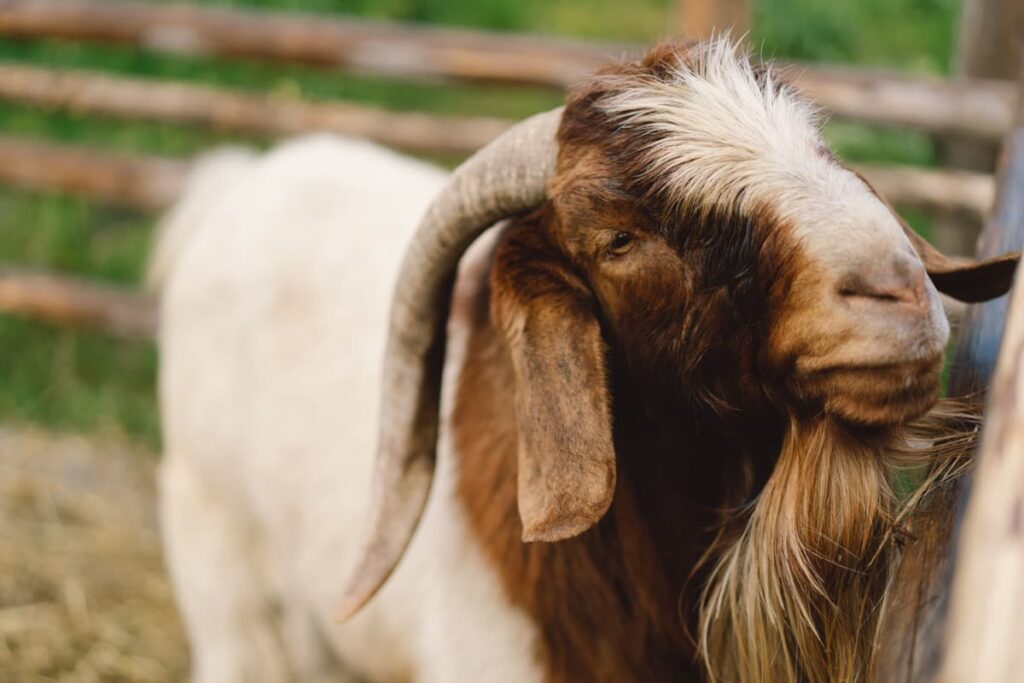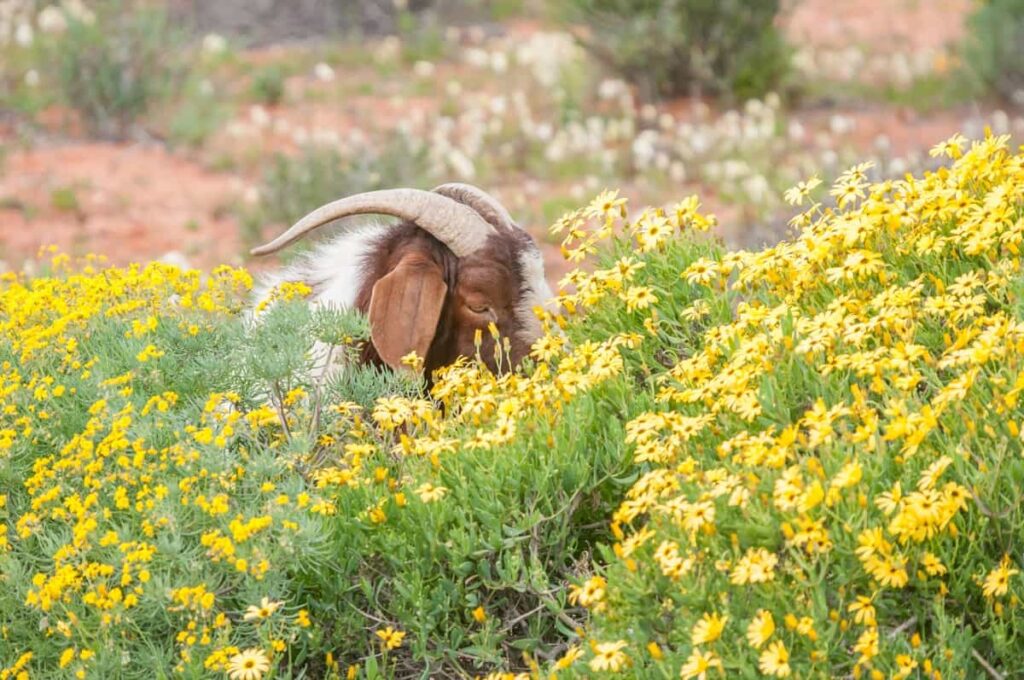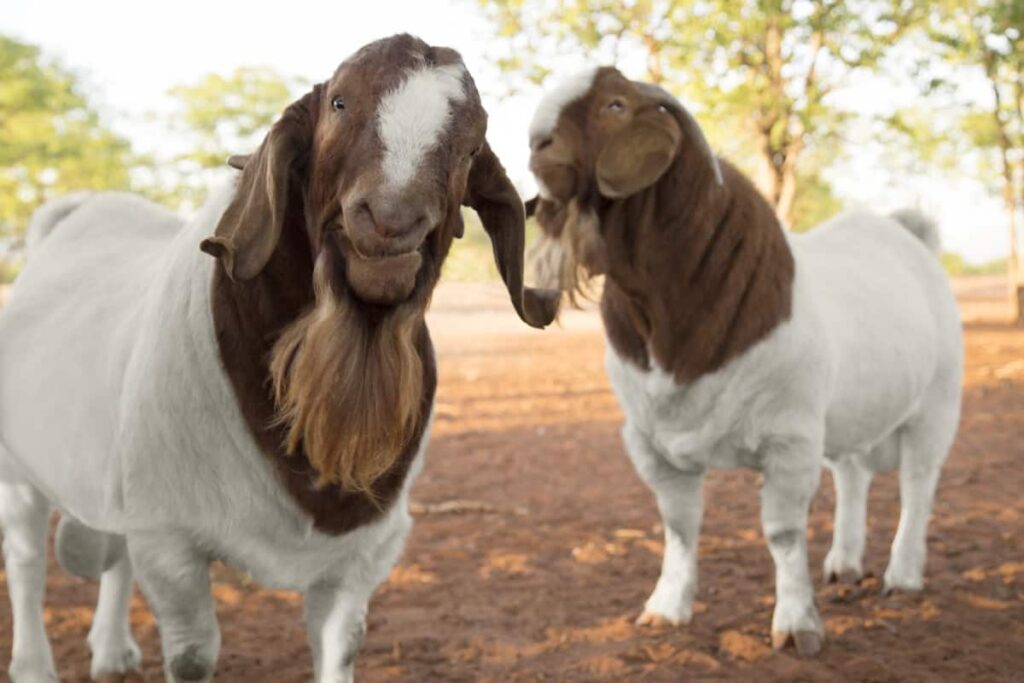The Boer goat, also known as the Boerbok, is a breed of meat goat that originated in South Africa. It was bred specifically for its high-quality meat, making it the world’s premier meat goat.

Boer Goat Breed
The Appearance of Boer Goats
- Boer goats are also known for their docile nature and adaptability to different environments. They have brown eyes, lop ears that hang downwards, backward-curving horns, and strong legs.
- They can thrive in both hot and cold climates and do well on various types of terrain. Due to their exceptional quality meat production capabilities, they’re highly valued among farmers worldwide. Many countries have imported them to improve the genetic makeup of their herds.
Boer Goat Characteristics
- The ideal Boer goat should be large and stocky, with a white body and a distinctive brown head. This coloration is visually appealing and helps farmers spot potential health issues early on. Additionally, they have brown eyes that give them an alert look, lop ears that hang downward, backward-curving horns, and strong legs.
- Boer goats are known for their hardiness and adaptability to various environments. Their ability to thrive in harsh conditions makes them ideal for farmers in challenging climates.
- Boer goats are generally docile and friendly animals, making them easy to handle by both experienced and novice handlers alike.
- Male Boer goats can weigh an average of 114 kilograms, while females weigh slightly less at around 94 kilograms.
- These unique physical characteristics make Boer goats stand out from other breeds. Their impressive size makes them perfect for those looking to breed top-quality meat goats or raise them as pets.
How to Raise Boer Goats?
- You must always ensure that your Boer goats have access to fresh water. Dehydration can lead to serious problems in goats, so keeping their water supply clean and replenished is important.
- Ensure that your goats have sufficient space for grazing or exercise. Boer goats are active animals and require plenty of room for movement.
- It’s also important to provide your Boer goats with a balanced diet that includes hay or pasture grasses and grain or goat feed. You want to consult a veterinarian or livestock nutritionist for the appropriate feeding regime.
- In addition, regular veterinary check-ups are essential for maintaining the health of your herd. Your vet can advise you on vaccinations, parasite control measures, and other preventive healthcare practices.
- Providing adequate shelter is crucial when raising Boer goats. A sturdy barn or shelter should protect them from extreme weather conditions like rainstorms or heat waves.
Tips for Buying a Boer Goats
- It will help if you find the purpose of buying a Boer goat. If you want it for meat production, look out for reputable breeders in your area who have experience breeding Boer goats.
- When visiting potential breeders, take note of their farms and how they treat their animals. Ask about any health issues with the herd and check if the breeder provides proper vaccinations and deworming programs. The appearance of the animals also matters; ensure that they have good body conformation and meet standard breed requirements.
- Price is another factor to consider when purchasing a Boer goat. Investing in healthy and well-bred stock will pay off in terms of productivity.
- Ensure you have enough knowledge to care for your new boer goat once purchased, as proper care is crucial to its overall health and productivity.
In case you missed it: Goat Breeding and Genetics for Improved Productivity and Disease Resistance

Breeding Boer Goats
- Breeding Boer goats can be profitable as they offer multiple income streams, such as selling breeding stock or selling their offspring at market prices.
- It is an exciting and rewarding endeavor. The main step in the breeding process is to select a suitable buck and doe pair that complement each other’s physical traits. Choosing animals with good conformation, strong legs, and excellent muscling is essential.
- When it comes to mating, natural breeding or artificial insemination can be used. Natural breeding allows for more genetic diversity in the offspring, while artificial insemination can provide access to superior genetics from distant locations.
- Once the female goat becomes pregnant, it’s important to maintain proper nutrition and health care throughout gestation. A healthy pregnancy will result in healthier kids at birth.
- After kidding, the kids should be separated from their mothers after a few days for easier management of feeding schedules.
Choosing Feed Options for Your Boer Goats
- A healthy diet is essential for Boer goats to grow and thrive. On average, Boer goats need to eat between 3% and 4% of their body weight in feed per day.
- It’s important to note that this can vary depending on the goat’s age, size, and activity level.
- It will help if you provide Boer goats with high-quality hay or pasture grasses as the bulk of their diet. Additionally, supplementing with grain-based feeds can help meet their nutritional needs.
- Be sure they have access to fresh water at all times.
- Providing proper nutrition through an appropriate diet plan for each goat’s needs will ensure strong growth and good health in your herd.
Boer Goat Health Care Tips
- Taking care of Boer goats is crucial to their health and productivity. Regular check-ups, vaccinations, deworming, and hoof trimming are essential in keeping your herd healthy. Proper nutrition, a clean water supply, and adequate shelter will help maintain their well-being.
- Boer goats are generally hardy animals but may still be susceptible to pneumonia or foot rot. It’s important to consult with a veterinarian if you notice any unusual symptoms in your goats.
- Also, managing the breeding process should be carefully planned, as it can affect the quality of your Boer goat’s offspring.
- Boer goats are herbivores and require a diet rich in fiber and nutrients. Please provide them hay or grass for grazing and additional supplements such as grains or pellets. Not overfeeding your goat is important, as obesity can lead to health problems.
- Boer goats also require regular grooming, including trimming their hooves every 6-8 weeks. This prevents any infections from developing and keeps them comfortable on their feet.
- Give your Boer goat ample exercise by allowing them time outside their enclosure daily.
In case you missed it: Innovative Housing and Shelter Designs for Profitable Goat Farming

Conclusion
The Boer goat was bred specifically for its meat production qualities and quickly became popular throughout the country due to its hardiness and ability to thrive in difficult conditions. Owning and raising Boer goats requires dedication and knowledge about proper care and management techniques. However, with the right approach, these meat-producing animals can provide income sources for farmers while being an enjoyable addition to any farm.
- Types of Grass Growing for Goat Farm
- How to Train Goats for Milking: A Beginners Guide
- Goat Milking Practices and Equipment: A Beginner’s Guide
- Goat Farming for Fiber: Producing Mohair and Cashmere
- Maximizing Goat Milk Production: Tips for Dairy Goat Farmers
- Goat Farming as a Family Business: Strategies for Success
- Profitable Kenya Goat Breeds for Commercial Dairy and Meat Business
- Unlock the Secrets of Oberhasli Goat: Discover Raising and Management Practices
- Ultimate Guide to Myotonic Goats: Explore Profile to Raising
A good business that not requires so much capital..
I want boer goats 1male and female
I need boer goats 4 female, 1 male (male different blood line)
Interested to buy Boer Buck and does for starter
Am grateful for all the info you made available.
Am a goat farmer from Ghana and wish to associate with you for guidance.
Please can I get Boer goats breed?
I need your help please.
In witch country can I buy Boer goat for goats farming?